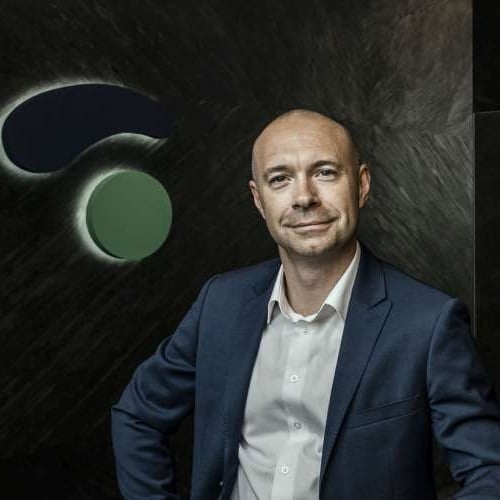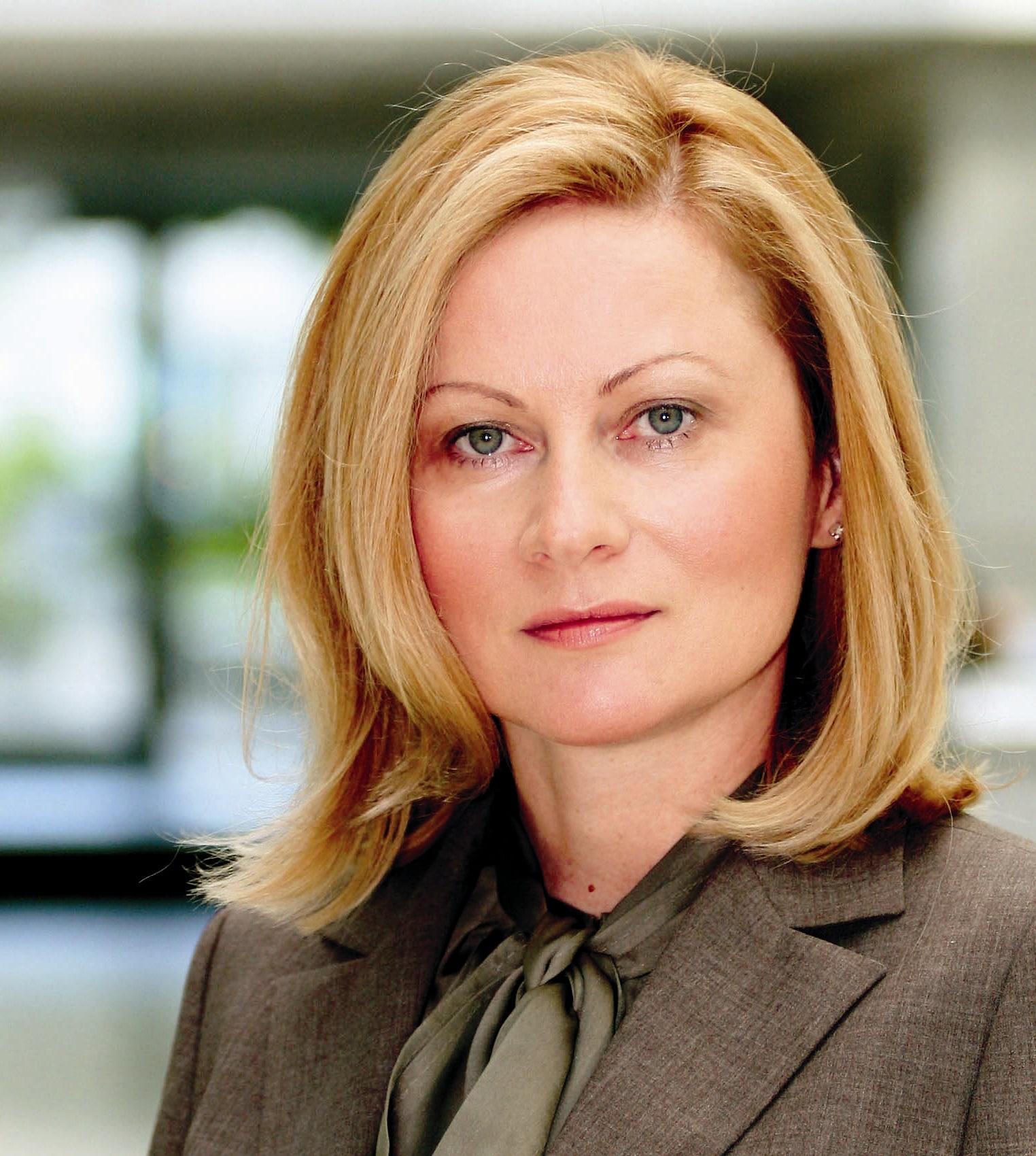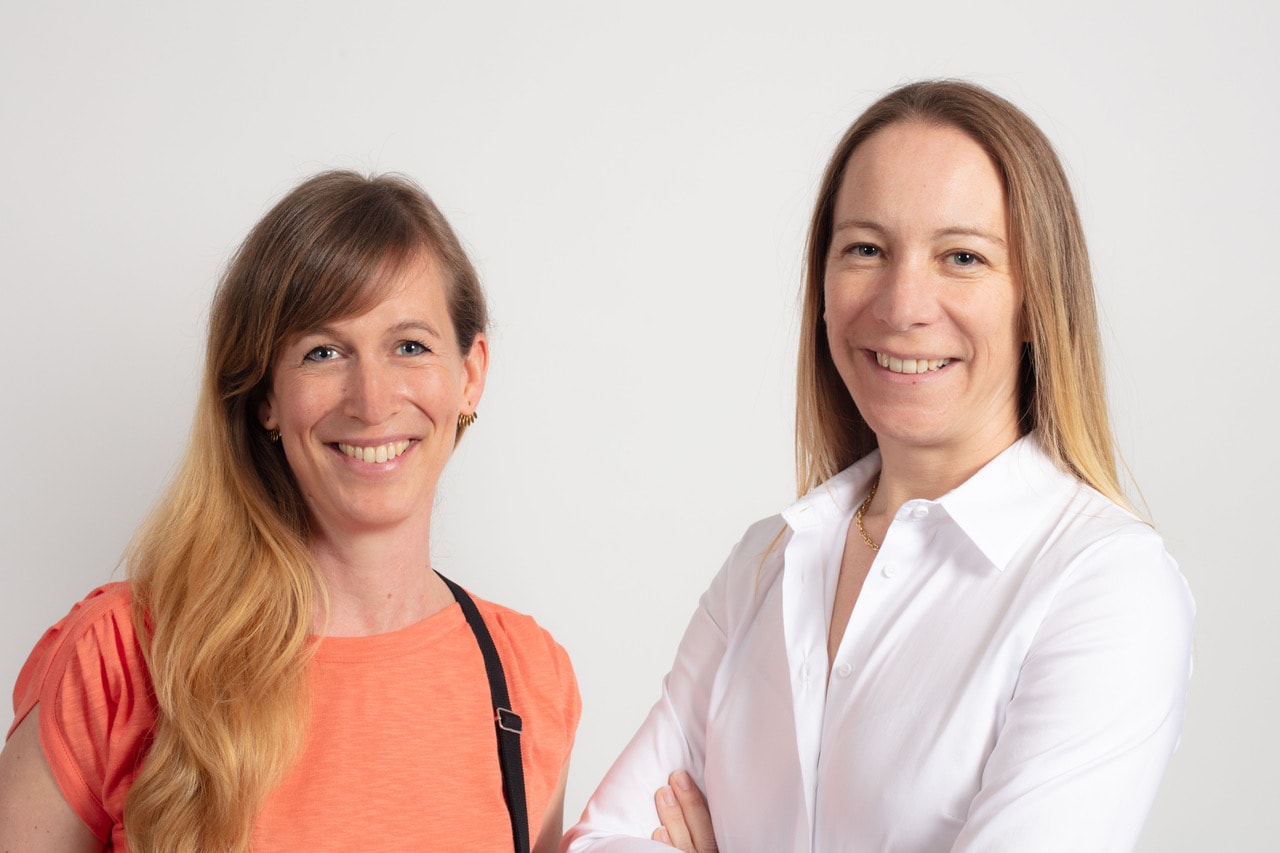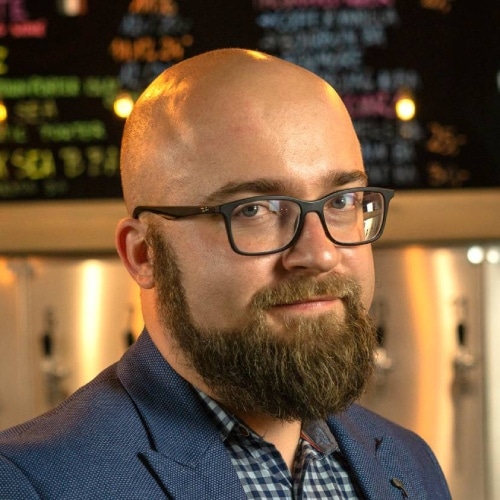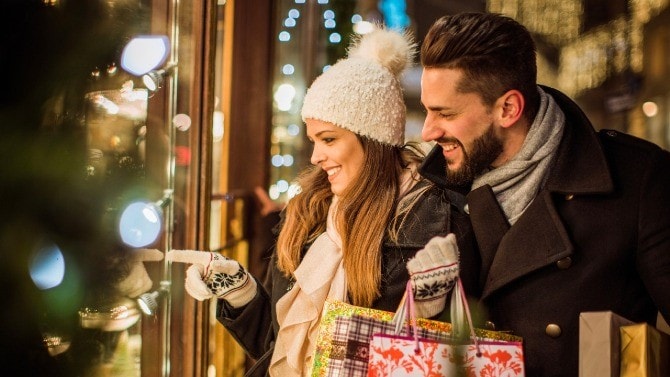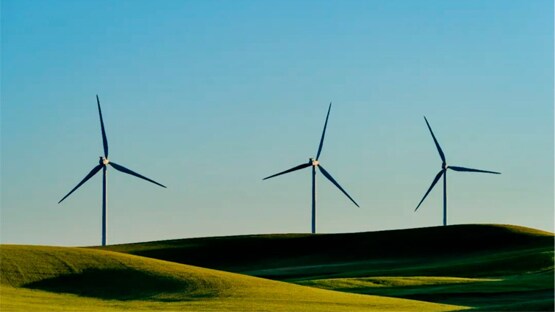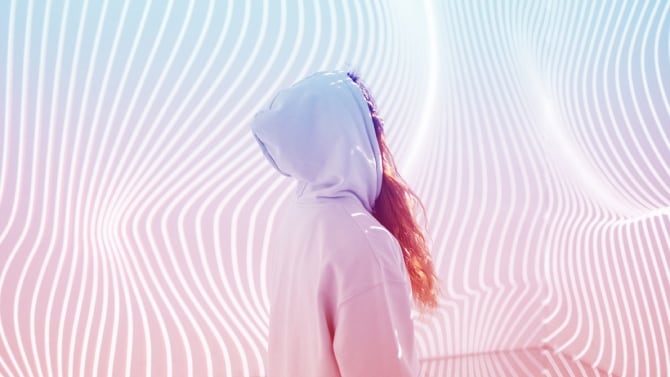{{item.title}}
{{item.text}}

{{item.title}}
{{item.text}}
PwC Retail Platform zawiera tworzone przez ekspertów PwC i Strategy& unikalne treści dotyczące szeroko rozumianej transformacji biznesu w kontekście najnowszych trendów rynkowych oraz zmieniającego się otoczenia.
Dostrzegając potrzebę podejścia kompleksowego do zagadnień biznesowych materiały ukazują dane zagadnienie z trzech różnych perspektyw: konsumenta, organizacji i operacji oraz regulacji. Celem naszej platformy jest dostarczenie osobom z rynku FMCG i handlu detalicznego porcji wartościowych informacji pomocnych w codziennej pracy.
"Daj swoim rzeczom drugie i długie życie!" - pod takim hasłem przewodnim działa firma Ubrania do oddania, zajmująca się zbieraniem odzieży i przekazywaniem jej organizacjom charytatywnym. Zobacz fragment wywiadu z Tomaszem Bocianem, CEO firmy.
Pełną wersję materiału znajdziesz na stronie odcinka.
Zależy nam na osiągnięciu odpowiedniej równowagi między e-commercem a offlinem, który staje się coraz bardziej zdigitalizowany. Będziemy dalej rozwijać nasz unikalny model omnichannel, w którym offline ma się przenikać z online. Sklepy stacjonarne CCC coraz częściej stają się źródłem pozyskiwania klienta e-commerce. Kontynuujemy proces ich cyfryzacji: około 200 lokalizacji zostało już wyposażonych w tablety do zakupów internetowych - obecnie już 15% obrotów ccc.eu w Polsce pochodzi właśnie z tabletów. Planowane jest dalsze rozwinięcie tego rozwiązania w Polsce i zagranicą. Tu ważną rolę odgrywa nasza kadra sklepowa. Nawet najlepsza technologia niewspierana przez człowieka, nie będzie funkcjonować tak efektywnie jak przy połączeniu pracy pracownika - doradcy i ambasadora CCC – oraz odpowiedniego narzędzia. W przygotowaniu są także m.in. kasy samoobsługowe oraz kioski internetowe. Testujemy też wysyłki e-commerce ze sklepów, z zamiarem pełnego uruchomienia tej funkcjonalności na przełomie Q1/Q2 2021 roku. To wszystko pokazuje realną zmianę w zachowaniu klientów i wagę wprowadzania cyfrowych rozwiązań do sklepów stacjonarnych. Przy okazji, zapraszamy do sklepów eobuwie.pl, których mamy już blisko 30 w całej Polsce oraz do nowego sklepu Modivo, które właśnie takie przenikanie się światów prezentują doskonale. To wszystko dowodzi, że sklepy dalej będą istnieć, ale zmieni się ich rola.
Konsumenci szukają obecnie różnych form na robienie zakupów, a e-commerce daje coraz więcej rozwiązań. To co klienci doceniają na naszej platformie, to nie tylko możliwość zrobienia zakupów spożywczych online wraz z dowozem do domu, ale przede wszystkim wybór sklepu, z którego ma być skompletowane zamówienie. Fakt, że skupiamy największe sieci sklepów ma w tym wypadku niebagatelne znaczenie.
Jednak to co doceniane jest chyba najbardziej to możliwość kontaktu z osobą, która kompletuje zamówienie. W przypadku gdy nie jest dostępny wybrany przez klienta produkt ma on możliwość decyzji czy woli zamiennik, a jeśli tak to który, czy chciałby jednak zrezygnować. Dzięki temu konsument ma czynny udział w wyborze produktów i doskonale wie jakie produkty finalnie otrzyma. Całość odbywa się bezkontaktowo i bezgotówkowo, abyśmy szczególnie w tym trudnym czasie pandemii mogli wszyscy dbać o swoje zdrowie i bezpieczeństwo.
Nasza platforma to także nowoczesny kanał komunikacji dla marek. Klienci mogą zostać poinformowani zarówno o promocjach, jak i nowościach czy akcjach niestandardowych danej marki. Każda decyzja zakupowa jest zapamiętywana, co przekłada się na dostęp do analityki zachowań oraz skuteczności działań reklamowych i promocyjnych. Zaufali nam już tacy giganci jak Żywiec Zdrój, Pepsico czy Kompania Piwowarska, a szereg innych marek testuje obecnie możliwości platformy.
Everli to też możliwość dla właścicieli sklepów dodatkowego, coraz popularniejszego w obecnych czasach kanału dystrybucji, a wszystko to, bez konieczności stawiania kosztownej infrastruktury technologicznej i logistycznej. Zarówno w sklepach stacjonarnych jak i w sklepie online mogą odbywać się te same działania reklamowe czy promocje. Partnerzy mają możliwość sprzedaży swoich produktów w 17 miastach Polski, w którym platforma jest obecna, a to pozwala na szybkie skalowanie biznesu w kanale e-commerce. W ciągu kilku ostatnich miesięcy odnotowaliśmy większą liczbę nowych rejestracji, niż przez 3 lata działalności, a średni wzrost klientów sięgał 1000%.
Myśląc o ciągłym rozwoju planujemy w najbliższym czasie ekspansję międzynarodową. Jesteśmy już od lat z sukcesem obecni we Włoszech, gdzie współpracujemy z ok. 30 sieciami handlowymi oraz stale pozyskując nowych partnerów. To jednak dla nas dopiero początek naszego rozwoju zagranicą. E-commerce bowiem rośnie w siłę.
E-commerce jest najszybciej rozwijającym się kanałem sprzedaży i w obecnych czasach wymaga trochę szerszego spojrzenia. To nie tylko e-commerce, ale coraz częściej m-commerce - obserwując zachowania konsumentów, szczególnie młodych, można zauważyć zwiększony udział transakcji za pomocą telefonu czy tabletu. Na pewno ten sposób dotarcia do konsumentów ma ogromny potencjał. To właśnie przy m-commerce kluczowe okazuje się pozycjonowanie produktu, które obecnie staje się jednym z istotnych wyzwań dla sprzedających. W związku z tym, że ekran telefonu czy tabletu jest mniejszy, z ograniczoną liczbą rekordów to znalezienie się na pierwszej bądź drugiej stronie w wyszukiwarce staje się coraz trudniejsze. Nie bez znaczenia jest również odpowiednie przedstawienie produktu w internecie. To czy jest on dobrze opisany, czy załączone są zdjęcia z różnej perspektywy i w dobrej jakości oraz czy użyte są słowa klucze ma przełożenie na zainteresowanie konkretnej grupy klientów szukającej tego właśnie produktu. Rosnąca świadomość konsumentów powoduje, że poszukują coraz więcej szczegółowych informacji, które pozwolą im zdecydować, który produkt spełni ich oczekiwania.
Tak naprawdę to co jest przyszłością i do czego wszyscy dążymy to podejście omnichannel, w ramach którego integrowane są wszystkie kanały sprzedaży, zarówno offline jak i online. Kluczowym staje się również utrzymywanie relacji z konsumentem, tak aby móc jak najlepiej odpowiedzieć na jego potrzeby. Jest to również bardzo ważne w obliczu pandemii, która zmieniła nasze zachowania zakupowe. Te najbardziej wyraziste zmiany spowodowane były restrykcjami oraz obawami związanymi z naszym bezpieczeństwem czy wreszcie z dostępnością towarów. Na początku pierwszej fali można było zauważyć duże zainteresowanie wybranymi grupami produktów, w tym również dla zwierząt domowych. Większa była wartość koszyka przy zmniejszonej liczbie wizyt w sklepie.
W czasie lockdownu zaobserwowaliśmy również, że więcej osób podjęło decyzję o adopcji psa lub kota. Istnieją setki badań, które opisują korzyści, jakich doświadczamy dzięki obecności zwierząt w naszych domach. Lepsze samopoczucie, łatwiejsze radzenie sobie ze stresem, większa pewność siebie, mniejsze prawdopodobieństwo nadwagi czy wreszcie sprawny układ krążenia. Zatem oprócz oczywistego wpływu na nasze zdrowie psychiczne i fizyczne posiadanie zwierząt domowych jest dodatkowo pretekstem do wyjścia na spacer co ma niebagatelne znaczenie przy zachowaniu work-life balance.
Obserwujemy dynamiczny rozwój w obszarze technologii produkcji oraz technologii cyfrowej. Przyczyn tego zjawiska jest wiele, ale wiodące są te ekonomiczne. Działa tutaj pewnego rodzaju sprzężenie zwrotne: rozwój technologii poprawia efektywność biznesu, który kalkulując efekt inwestuje śmielej w rozwój kolejnych projektów.
Zmiana ta widoczna jest w wielu obszarach biznesu, od łańcucha dostaw po relacje z klientami. Im bardziej biznes jest oparty o produkcję lub o usługi w świecie cyfrowym tym większe korzyści może czerpać z rozwoju technologii. W przypadku procesów produkcji zmiana najczęściej kojarzona jest z automatyzacją procesów. W zakresie usług cyfrowych natomiast kojarzona jest m.in. z transformacją cyfrową opartą na strategii “data driven” czy wykorzystaniem sztucznej inteligencji - wszystko by jak najefektywniej spełniać potrzeby klientów.
Przyglądając się tym zmianom można dostrzec drugi samonapędzający się mechanizm; im więcej zautomatyzowanych lub cyfrowych procesów, tym więcej wygenerowanych danych, a tym samym większe szanse na rozwój zaawansowanej analityki, usprawniającej w kolejnym kroku dalszy proces automatyzacji, ale też i efektywnych decyzji biznesowych. Z kolei rozwinięta analityka napędza dalszy postęp.
Mamy więc drugi mocny motor obserwowanej rewolucji technologicznej. Pierwszy był ekonomiczny, drugi jest zaś bardziej substancjalny. Przyczyn progresu jest oczywiście znacznie więcej, ale wydaje się, że powyższy zarys już pokazuje, że otacza nas realna przemiana o zasięgu globalnym, która wymaga zdecydowanego, ukierunkowanego i szybkiego działania w świecie biznesu. Czytaj dalej ›
Pandemia zdecydowanie przyspieszyła zmiany w branży retail, która jeszcze bardziej musi podążać za zmianą zachowań klientów. Obserwujemy zmiany w komunikacji online, ale przede wszystkim w obsłudze i systemie zakupowym. Z naszych doświadczeń jasno wynika, że rozwiązania biometryczne są nie do uniknięcia ze względu na wygodę i bezpieczeństwo zarówno dla klienta, jak i dla merchanta. Ten trend jest już widoczny także przy okazji zakładania konta w banku na selfi, czy też akceptacji umów. Pilotażowo działa już płatność okiem, a to dopiero początek.
Ostatni raport organizacji płatniczej VISA pokazuje, że aż 62 proc. polskich konsumentów gotowych jest korzystać podczas zakupów z uwierzytelnienia biometrycznego zamiast posługiwania się hasłami. 73 proc. uważa te rozwiązania za szybsze i wygodniejsze w obecnym stosowaniu. Sprawdzamy, to z powodzeniem w praktyce, bo odchodzenie od gotówki sprzyja rozwojowi naszego biometrycznego systemu płatniczego. PayEye właśnie w okresie pandemii, pod koniec czerwca 2020 r. wdrożył pierwszą na świecie płatność okiem, opartą na biometrii tęczówki oka. Już nie jest problemem brak karty płatniczej, rozładowany telefon albo brak gotówki w kieszeni.
Kierunek biometria dla branży retail jest więc naturalny i to z kilku powodów. Pandemia sprawiła, że klienci szukają wygodnego i bezpiecznego systemu płatniczego. Podobne oczekiwania chociażby ze względu na zachowanie reżimu sanitarnego mają również merchanci. Nie chcą narażać własnego personelu na zbędne dodatkowe kontakty, jak i klientów. Do tego dochodzi oszczędność czasu, ponieważ cały proces transakcji można ewidentnie przyspieszyć. Płatność przy kasach trwa zdecydowanie szybciej niż kartą, czy gotówką, bo nie liczy się tylko sam moment zbliżenia karty, czy też wręczenia gotówki. Klienci niemal za każdym razem szukają karty w kieszeniach lub torebkach, dotyczy to również telefonu, czy pieniędzy. PayEye sprawia, że w zasadzie nic nie musimy szukać, wystarczy podejść i zapłacić okiem. Klient i sprzedawca oszczędzają wiele cennych minut, co szczególnie jest ważne przy niepełnej obsadzie kas.
Biometria ma jeszcze ten walor, że wspiera silne uwierzytelnianie użytkowników i już dziś widać, że rozwiązania te oprócz płatności można wykorzystać znacznie szerzej – w naszym codziennym życiu np. jako forma dostępu do pomieszczeń lub magazynów, potwierdzania umów, decyzji, czy też identyfikacji osób. Światowa agencja badawcza „Markets and Markets” szacuje wzrost przychodów z globalnego rynku technologii biometrycznych z 36,6 mld USD obecnie, do blisko 69 mld USD w 2025 r. Ten rynek dopiero się tworzy, ale rośnie w ogromnym tempie. Kto prześpi ten trend zrobi przysługę konkurencji.
Czasy, kiedy wystarczyło mówić o wdrażaniu rozwiązań AI w biznesie, dawno minęły. Ze względu na szybki rozwój handlu elektronicznego w okresie pandemii obecnie status ten zmienił się z „nice to have” na „must have”. Detaliści, którzy szybko dostosowują się do tej nowej post-covidowej rzeczywistości i już wdrażają rozwiązania oparte na sztucznej inteligencji, nadal mogą uzyskać przewagę konkurencyjną. Jednak najistotniejsze jest to, że zwiększają tym samym swoje szanse na skuteczne konkurowanie z firmami takimi jak Amazon czy Zalando. Firmy te już kilka lat temu wdrożyły najbardziej zaawansowane technologie sztucznej inteligencji, co teraz pozwala im sukcesywnie zwiększać przewagę nad firmami, które nie zainwestowały wystarczająco dużo w tym obszarze. W raporcie “Humans + bots: Tension and opportunity” MIT opisuje „jak najlepsze światowe marki łączą umiejętności ludzkie i sztuczną inteligencję w celu budowania bliskich relacji z klientami i napędzania wzrostu”, co potwierdza, że korzyści płynące z rozmieszczania asystentów w handlu detalicznym są już znaczące. „Juniper szacuje, że do 2023 r. chatboty wdrożone w sektorze handlu detalicznego na całym świecie pozwolą zaoszczędzić branży 11,5 miliardów dolarów kosztów i wygenerują ponad 112 miliardów dolarów przychodów ze sprzedaży. ”
Misją Yosh.AI jest wzmocnienie pozycji sprzedawców detalicznych poprzez dostarczenie najnowocześniejszych rozwiązań AI w handlu konwersacyjnym jak również rozpoznawaniu obrazu. Te dwa obszary sztucznej inteligencji rewolucjonizują zakupy online, zapewniając nie tylko znacznie przyjemniejsze wrażenia dla klientów, ale także wyższe współczynniki konwersji dla sprzedawców detalicznych. Efektywność i zwrot z inwestycji w te rozwiązania są stale potwierdzane przez klientów Yosh.AI, czego dowodem jest wdrażanie ich na całym świecie. Czytaj dalej
W ubiegłym roku stałym tematem naszych dyskusji była przyspieszona transformacja cyfrowa i mocne wejście w e-commerce biznesów każdej wielkości, wymuszone przez pandemię. Wiele firm zostało wręcz “katapultowanych” 5 lat w przyszłość. Dotyczy to zarówno procesu sprzedaży, reklamy, jak i komunikacji między pracownikami, czy z klientami.
Wynika to ze zmiany zachowań konsumentów, którzy od początku pandemii spędzają w sieci znacznie więcej czasu. Widać to chociażby w statystykach Facebooka. W szczycie pandemii liczba informacji wysyłanych za pośrednictwem naszych komunikatorów wzrosła o ponad 50 proc. Czytaj dalej
Rok 2020 postawił przed branżą handlową szereg wyzwań w związku pandemią COVID-19. Handel musiał zmierzyć się z ograniczeniami w działalności (m.in.: limity klientów przebywających jednocześnie w sklepie, godziny dla seniorów) oraz czasowym lockdownem, którym objęte zostały galerie handlowe i sklepy z artykułami przemysłowymi.
W trosce o zdrowie pracowników i konsumentów sieci handlowe wdrożyły w swoich placówkach maksymalne środki bezpieczeństwa, co wiązało się z koniecznością poniesienia dodatkowych kosztów na poziomie 400 mln zł oraz zmianami w systemie organizacji pracy sklepów i centrów dystrybucji. Branża handlowa dołożyła wszelkich starań, aby – w tych nadzwyczaj trudnych warunkach – utrzymać ciągłość łańcucha dostaw i tym samym zapewnić zaopatrzenie w żywność i niezbędne artykuły milionom polskich rodzin. Tradycyjny handel wykazał się dużą elastycznością w dostosowaniu się do nowych zwyczajów zakupowych konsumentów. Czytaj dalej
W 2020 r. roku mimo trudności związanych z pandemią zdecydowaliśmy się zrobić przegląd naszej działalności i przygotowaliśmy plan działań do roku 2025. Jednym z elementów pracy nad strategia była analiza czynników, które odróżniają nas od innych operatorów krajowych i europejskich. Najważniejsze odkrycie odnaleźliśmy na wyciągnięcie ręki, było praktycznie przed naszymi oczami. Zauważyliśmy, że na rynku polskim jest dwóch dużych operatorów, z których jeden pozycjonuje się jako „lider kosztowy” a drugi jako „lider produktu” w zakresie kompleksowości i jakości, co dla nas stworzyło potencjał rozwoju jako „lidera dopasowania”.
Równocześnie, w ramach przeglądu zewnętrznego stwierdziliśmy, że różnorodne wymagania klientów, które spełniamy (dotychczas postrzegane przez nas trochę w wymiarze utrapienia), mogą być źródłem naszej przewagi konkurencyjnej. Dotychczas kierowaliśmy się popularnym założeniem, że logistyka z natury lubi standaryzację. W procesie budowy strategii odkryliśmy jednak, że naszą podstawową przewagą jest umiejętność godzenia różnych potrzeb i interesów (branż, temperatur, wymagań, lokalizacji, przepływów) klientów, które w pewnej skali, dobrze zarządzone, mogą się równoważyć i uzupełniać. Czytaj dalej
Przyszłością logistyki są zarówno ekologia jak i wręcz natychmiastowe odpowiadanie na potrzeby klientów. To wymaga ciągłej analizy ścieżek, jakimi podążają nasi klienci oraz szybkiego wyciągania wniosków. Nie ma zatem współczesnej logistyki bez silnego wsparcia data analytics i wypracowanych narzędzi do automatyzacji procesów.
Wyzwaniem czasu jest, aby rozwiązania logistyczne były możliwie najmniej uciążliwe dla środowiska. Nasza sieć Paczkomatów wpisuje się w ten trend. Dzięki nim redukujemy szkodliwe emisje w miastach o 60 proc., a na wsiach nawet o 90 proc. w porównaniu do tradycyjnych przesyłek kurierskich. Oczywiście nie bez znaczenia pozostaje jeszcze sprawa odbioru przesyłki przez klienta tak, aby nie generowała ona dodatkowego ruchu samochodów. Czytaj dalej
Dedykowana usługa dla przesyłek BHU (ang. Big Heavy Ugly) to rozwiązanie, które nabiera znaczenia na rynku. Czynnikami jej rozwoju są dynamiczny wzrost sprzedaży e-commerce i rosnące rozdrobnienie przepływów między przedsiębiorstwami (trend wzrostu udziału produkcji w "małych partiach").
BHU to paczki, które nazywamy niestandardowymi.
Big – gdy przekraczają standardowe gabaryty.
Heavy – gdy waga przekracza zgodną z regulacjami normę 31.5 kg.
Ugly – tzw. paczki "brzydkie", z którymi mamy do czynienia gdy z uwagi na kształt albo zawartość mogą zaburzyć sortowanie i niemożliwa jest więc ich obsługa w standardowym procesie kurierskim. Są to np. płyny, których wyciek czy wylanie może spowodować zatrzymanie procesu. To jednak nie tylko zwykłe płyny, ale też pojemniki zawierające tzw. ADR LQ, czyli niskie zawartości towarów niebezpiecznych. Mogą to być też alkohole - zarówno przemysłowe, jak i spożywcze. Do tzw. “Uglies” zalicza się też przesyłki o nietypowych kształtach.
Firmy kurierskie z reguły specjalizują się w obsłudze paczek o standardowych kształtach i wadze, więc sortery i stoły sortownicze dopasowane są zwykle do regularnych opakowań. Zdarzają się jednak również takie paczki, z których np. wystaje jakiś element lub ich kształt powoduje utrudnienie dla standardowego procesu obsługi przez sorter i takie paczki również mieszczą się w kategorii “Uglies”. Czytaj dalej
Czasy, w których jedyną miarą skuteczności przedsiębiorstwa był wypracowany zysk, już minęły. Dziś kluczowe stają się kwestie w jaki sposób, jakim kosztem i z jaką wartością dodaną uda się ten zysk osiągnąć. Widmo ekologicznej katastrofy i zmiany społeczne, które na nowo definiują relacje firm z klientami sprawiają, że w sposób fundamentalny zmienia się podejście do rozwoju gospodarczego. Zrównoważony rozwój, czyli odpowiedzialne zarządzanie aspektami ESG w prowadzonej działalności, to konieczność i nasz wspólny obowiązek, którego nie da się już odkładać na później.
Dla Banku BNP Paribas CSR (społeczna odpowiedzialność biznesu) i zrównoważony rozwój to elementy DNA. Celem banku jest bycie agentem pozytywnych zmian i liderem w zakresie zrównoważonych finansów. Strategia CSR i Zrównoważonego Rozwoju banku jest ściśle zintegrowana ze strategią biznesową „Fast Forward”. Drogowskazem dla banku, jest przyjęta przez ONZ w 2015 roku Agenda na rzecz zrównoważonego rozwoju 2030, która zawiera 17. Celów Zrównoważonego Rozwoju. Czytaj dalej
Z opublikowanego w ostatnim czasie raportu Morningstar, międzynarodowej agencji badawczej wynika, że na koniec ubiegłego roku wartość aktywów ulokowanych w funduszach uwzględniających kryteria ESG w ujęciu globalnym wynosiła 40,5 bln dolarów. Jednak przełomowe były wydarzenia, do których doszło w Europie w pierwszym kwartale tego roku. Aktywa ulokowane w fundusze typu ETF o charakterze ESG osiągnęły poziom 25,8 mld dolarów i przekroczyły poziom inwestycji w inne rodzaje funduszy ETF, gdzie wartość wpłat wyniosła odpowiednio 22,3 mld dolarów.
Uważa się, że zainteresowanie inwestycjami ESG jest stymulowane co najmniej trzema podstawowymi czynnikami. Po pierwsze pandemia Covid-19 pokazała, że działanie na rzecz przede wszystkim społeczeństwa niesie wymierne korzyści z perspektywy funkcjonowania firm w zmieniającym się otoczeniu biznesowym. Podmioty, które działają odpowiedzialnie zyskują zarówno w oczach pracowników, jak również klientów. Drugi ważny element jest związany z zainteresowaniem tego typu inwestycjami przez tzw. milenialsów. To efekt między innymi wkraczania na rynek nowego pokolenia świadomych konsumentów, dla których ważna jest ochrona środowiska naturalnego, bezpieczeństwo i stabilizacja warunków pracy oraz wysokie standardy zarządzania. Po trzecie należy wskazać na to, co kluczowe z punktu widzenia inwestycji: stopa zwrotu osiągana z lokaty kapitału. Z dostępnych danych wynika, że w 2020 roku trzy na cztery zrównoważone fundusze akcyjne pobiły wskaźniki rynkowe, a 25 z 26 funduszy indeksowych typu ESG pokonało fundusze szerokiego rynku. Znamienny jest przykład stopy zwrotu osiągniętej przez indeks MSCI Emerging Markets ESG Leaders w ciągu ostatnich 10 lat. Wskaźnik ten wzrósł o 150%, podczas gdy indeks MSCI Emerging Markets, czyli wszystkich spółek z rynków rozwijających, zyskał w tym samym czasie 59%. Nie ma wątpliwości, że są to czynniki kluczowe, które stanowią ważny wabik dla inwestorów szukających atrakcyjnych form lokaty kapitału. Czytaj dalej
Na przestrzeni ostatnich lat wzrasta świadomość i aktywność firm w obszarze zrównoważonego rozwoju. Tendencji tej nie zakłóciła nawet pandemia COVID-19. Paradoksalnie – ekstremalnie negatywne doświadczenia – wzmocniły zainteresowanie podmiotów tym nurtem.
Pandemia COVID-19 zmieniła wiele sfer życia. Mogłoby się wydawać, że ostatni rok nie sprzyjał myśleniu o realizacji długofalowych strategii czy też projektowaniu przyszłości. Można by też sądzić, że firmy skoncentrowane na doraźnych problemach, utrzymaniu płynności, walce o każde miejsce pracy czy wręcz o przeżycie na rynku – porzucą zainteresowanie realizacją celów zrównoważonego rozwoju (SDGs). Nic bardziej mylnego. Czytaj dalej
Idea stawiająca człowieka i jego potrzeby w centrum uwagi od ponad 20 lat przyświeca budowaniu strategii Żabki oraz znajduje odzwierciedlenie w misji, wizji i wartościach naszej organizacji. Dlatego w Żabce z dumą patrzymy nie tylko na wyniki finansowe i ekspansję naszej sieci. Żabka to przede wszystkim ludzie, którzy ją tworzą: nasi pracownicy, współpracownicy i franczyzobiorcy. Realizację strategicznych priorytetów łączymy z braniem odpowiedzialności za to co ważne dla nas i naszych kluczowych interesariuszy. Zgodnie z naszymi filarami strategii koncentrujemy uwagę na zrównoważonym stylu życia, wywieraniu pozytywnego wpływu na otoczenie, odpowiedzialności za naszą organizację i w końcu na tym wszystkim, co związane jest z miejscem, w którym my i przyszłe pokolenia będą mieszkać – zieloną planetą. Obsługując codziennie ok. 2,5 mln klientów, współpracując z blisko 6 tys. franczyzobiorcami oraz kilkoma tysiącami pracowników, mamy moc sprawczą, ale i obowiązek, by codziennymi decyzjami zmieniać świat na lepszy – tworzyć wartość poprzez upraszczanie życia ludziom. Czytaj dalej
W czasach postcovidowych utrzymanie klientów jest ważniejsze niż kiedykolwiek wcześniej. Jako marka, mogą Państwo wprowadzić swój własny program lojalnościowy angażujący Państwa klientów lub wejść w sojusz z innymi markami i wprowadzić program koalicyjny.
Koalicyjny program lojalnościowy, zwany również wspólnym programem lojalnościowym polega na wspólnym działaniu wielu niepowiązanych ze sobą marek na zasadzie partnerstwa. Klienci zyskują więcej swobody i szerszą gamę zachęt dzięki temu, że zdobywają punkty od wszystkich marek uczestniczących w programie, a punkty uzyskane od jednej marki mogą realizować u innej (także uczestniczącej w programie).
Koalicyjne programy lojalnościowe tworzone są przez jedną firmę, a następnie rozszerzane na innych uczestników. Właściciel programu odpowiada za zarządzanie nim oraz nadzór nad procesem rozliczania. Marki uczestniczące w programie zachowują pewien zakres swobody, a równocześnie korzystają ze zwiększonego ruchu oraz danych zebranych za pośrednictwem programu. Czytaj dalej
Odzyskujemy właśnie siły po ostatnich wyjątkowo niespokojnych miesiącach i możemy już chyba powiedzieć, że IKEA wyszła z tych zawirowań mocniejsza. W trudnej sytuacji, która dotknęła nas wszystkich, zadbaliśmy o naszych współpracowników i lokalne społeczności, a także całkowicie zmieniliśmy sposób prowadzenia działalności, stając się sprzedawcą w 100% internetowym.
Równocześnie w sierpniu 2020 r. IKEA Family odnotowała wielki sukces – liczba członków naszego klubu na całym świecie osiągnęła 150 milionów. To, że dom stał się dla wielu z nas najważniejszym miejscem, uważamy za wielką szansę, aby jeszcze bardziej inspirować naszych klientów.
IKEA FAMILY jest dla IKEA kopalnią złota. W naszym przypadku jednak złoto oznacza ludzi, bezpośrednie relacje z naszymi klientami i dostęp do danych, którymi zechcą się z nami dzielić (bardzo cenimy prawo naszych klientów do prywatności i dajemy im możliwość łatwego kontrolowania ustawień prywatności).
Wraz z powiększaniem się naszego klubu o nowych klientów wzrasta też liczba wyzwań, z jakimi musimy się zmierzyć. Przez wiele lat zajmowaliśmy się przede wszystkim prowadzeniem sklepów stacjonarnych. Dlatego wypracowanie całościowego podejścia do klienta, zarówno w świecie realnym, jak i wirtualnym, to dla nas duża zmiana. Teraz nie będziemy już prowadzić działalności tylko w sklepach, ale po prostu w Polsce. Czytaj dalej
Firmy, które robią to, co zawsze, są skazane na klęskę. Firmy odnoszące sukcesy stale ewoluują i przekształcają swoje modele biznesowe, a ludzie są w samym sercu tej ewolucji.
Równa płaca za równą pracę to fundamentalny krok dla nowoczesnego biznesu i niezbędny czynnik umożliwiający transformację. Jak pracownicy mogą być zaangażowani, oddani i innowacyjni, wiedząc (lub wierząc), że nie są tak samo wynagradzani za tę samą pracę?
Firmy, które rozwiązują problem zróżnicowania wynagrodzenia ze względu na płeć, budują zaufanie pracowników, zwiększają różnorodność umiejętności, podnoszą swoją atrakcyjność dla utalentowanych kandydatów, pomagają kształtować inkluzywną i zróżnicowaną kulturę korporacyjną, a ostatecznie poprawiają swoje wyniki finansowe. Czytaj dalej.
Jesteśmy firmą zatrudniającą ponad 70 000 pracowników w sklepach, centrach dystrybucyjnych i biurach na terenie całej Polski. Pandemia koronawirusa była kryzysem, który spadł na wszystkich niespodziewanie i stał się powodem ogromnego niepokoju o własne bezpieczeństwo, stabilność finansową, a także poczucia braku pewności co do jutra.
Jako odpowiedzialny pracodawca zawsze czujemy ogromne zobowiązanie wobec całego zespołu Biedronki. Dlatego w czasie kryzysu skupiliśmy się przede wszystkim na: zapewnieniu bezpieczeństwa osobistego i rodzinnego naszym pracownikom, zabezpieczeniu ich stabilności finansowej oraz docenieniu ich nieustannego wysiłku w trakcie trwania pandemii. Komunikacja była jednym z naszych największych wyzwań, ponieważ musieliśmy błyskawicznie zaadaptować nowe narzędzia i kanały komunikacji, jednocześnie modyfikując nasz przepływ informacji zgodnie z ciągle zmieniającą się sytuacją pandemiczną i regulacjami prawnymi w niejednoznacznym środowisku. Jako podstawę komunikacji przyjęliśmy bliskość - bycie blisko naszych pracowników, słuchanie ich i reagowanie na ich potrzeby i obawy.
Ponadto, jako firma o kluczowym znaczeniu, zawsze dokładamy wszelkich starań, aby podejmować działania zgodne z naszą misją społeczną, jaką jest zapewnienie polskim konsumentom stałego dostępu do niezbędnych produktów. Dlatego też w czasie pandemii skupiliśmy się również na tym, aby w każdej chwili wypełniać naszą misję zapewnienia poczucia stabilności polskiemu społeczeństwu, a także wzmocnić zrozumienie tej ważnej misji wśród naszych pracowników i podkreślić ich istotną rolę społeczną. Czytaj dalej.
Z firmą Żabka Polska obecnie prawie 1000 osób współpracuje w oparciu o inne niż etatowe formy zatrudnienia, takie jak umowa czy kontrakt. Pełnią one funkcje partnerów i managerów w obszarach: adaptacji, ekspansji, sprzedaży, audytu oraz szkoleń i rozwoju. Ze względu na rozwój organiczny sieci Żabka – zakładający uruchomienie w tym roku co najmniej 1000 nowych sklepów – firma nieustannie poszukuje współpracowników w każdym z tych obszarów. Dlatego zdecydowała się na zbudowanie tzw. Journey Map, czyli zbioru zasad i standardów na kolejnych etapach procesu współpracy.
W każdym z etapów tego procesu – od budowania wizerunku firmy, przez rekrutację, wdrożenie, ścieżki rozwojowe współpracowników, szkolenia, wynagrodzenia i benefity, aż po zakończenie współpracy – stworzyła nowe standardy, a także wyróżniki po to, by jej oferta była wyjątkowa na rynku polskim.
W ramach realizacji projektu Żabka powołała szeroką grupę projektową złożoną z przedstawicieli poszczególnych departamentów firmy, grupy współpracowników oraz konsultantów zewnętrznych. Taki skład zespołu pozwolił na połączenie wiedzy płynącej z organizacji z ekspertyzą rynkową. Czytaj dalej.
Pandemia COVID-19, towarzyszące jej restrykcje oraz zakłócenia normalnej aktywności gospodarczej doprowadziły do przejściowego kryzysu wielu gałęzi polskiego przemysłu. Miniony rok to także czas pełen wyzwań dla całej branży spożywczej – w tym sektora convenience. Kategorii, która przez ostatnie lata rozwijała się jak żadna inna, by niemal zupełnie zniknąć na czas światowego kryzysu pandemicznego. Teraz wraca i to w dobrym stylu. Czytaj dalej.
Empik jest niekwestionowanym liderem sprzedaży wielokanałowej w Polsce – od lat opiera swoją strategię na dynamicznym rozwoju kanałów online i mobile przy jednoczesnej ekspansji sieci stacjonarnej. Już co 3. Polak kupuje w Empiku, a 60% naszych odbiorców to klienci omnichannel i udział ten stale rośnie. Z kolei co 4. konsument, który realizował zakupy wyłącznie w salonach, obecnie dokonuje ich również w e-commerce. Warto podkreślić, że Empik.com – jeden z czołowych polskich sklepów online, odnotowuje ponad 32% wzrost wizyt a średnia liczba sesji na rok to już ponad 230 mln. Czytaj dalej.
Po tegorocznym zimowym i wiosennym lockdownie Polacy wrócili do zakupów stacjonarnych w centrach handlowych. Obserwujemy nie tylko rosnącą odwiedzalność w naszych obiektach, ale też powracające, a nawet przekraczające poziomy sprzed pandemii, obroty najemców. Czwarty kwartał może być dobrym czasem na wzmocnienie branży, pod warunkiem utrzymania ciągłości operacji oraz braku ograniczeń w handlu. Czytaj dalej.
Popyt na e-zakupy rodzi podaż w e-sprzedaży, a wraz z rozwojem sprzedaży w kanałach online, rośnie także ilość procesów towarzyszących rozwojowi e-commerce. Sektor handlowy w obszarze rynku kurierskiego zmierza więc w kierunku maksymalnej optymalizacji tych procesów, uproszczeniu ich oraz dostosowaniu do potrzeb dzisiejszego e-konsumenta. Moim zdaniem pierwszym kluczowym trendem jest wzrost znaczenia automatyzacji. Coraz więcej firm decyduje się na sprzedaż w kilku kanałach sprzedaży internetowej. Efektywne działanie w modelu omnichannel wymaga integracji wielu systemów i narzędzi e-commerce. Firmy, które są gotowe na taką transformację lub już ją przeprowadziły znajdują się w korzystniejszej sytuacji, niż ich bardziej “analogowi” konkurenci. Czytaj dalej.
Sytuacja kosztowa w sektorze retail w ostatnim czasie się komplikuje. Niestety logistyka nie ma wpływu na wzrost kosztów rynkowych i musi dostosowywać się do zmian. Trudno jest pozyskiwać nowe kontrakty, ponieważ są one obarczone ryzykiem, a przewoźnicy dyskontują to ryzyko tworząc zapas marży. Dobra sytuacja jest wtedy, gdy zlecający transport zna już pewną grupę dostawców usług transportowych i operatorów logistycznych, bo to pozwala ocenić ryzyka i konieczność ich uwzględniania w warunkach kontraktów. Koszty będą rosły, ale trudno określić dziś dokładnie w jakim tempie. Większość uczestników rynku spodziewa się poziomu powyżej 10%. Na pewno można spodziewać się próśb o indeksację ze strony operatorów i przewoźników. Czytaj dalej.
Wszystkie podmioty rynkowe obserwują wzrost kosztów prowadzenia działalności. W tym sektor retail, który często korzysta z różnych rodzajów transportu, a to z uwagi na fakt, że ich łańcuchy dostaw sięgają daleko, niejednokrotnie aż do Azji. W obszarze transportu morskiego, największy skok kosztów jest za nami, aktualnie obserwujemy stabilizację z minimalnymi wahaniami w dół. Trudno jest cokolwiek prognozować, ale na ten moment nie spodziewamy się istotnych ruchów ani w górę, ani w dół. W kolejnym roku przewidujemy utrzymanie poziomów cen w tym segmencie. Z cenami transportu morskiego są silnie związane ceny transportu kolejowego i lotniczego na długich odcinkach. Jednak żaden z nich nie zastąpi morskiego, który obsługuje absolutną większość wolumenów. Czytaj dalej
Przy tworzeniu wszystkiego co nowe oprócz wizji i wyczucia strategicznego niezbędne jest stworzenie odpowiedniego produktu, który spełni oczekiwania klienta. Ponadto modele biznesowe w wielu branżach w ciągu ostatnich kilku lat uległy istotnej zmianie wprowadzając zmienność do swojego biznesu. Ta zmienność i jej umiejętne zarządzanie stało się przewagą konkurencyjną umożliwiającą w wielu przypadkach prowadzenie rentownego biznesu. Wynika to z faktu, iż zmienność jest atrakcyjna dla klienta, który sięga po nowy produkt często z powodu jego zmiany, odróżniając go tym samym od produktów konkurencji. W wielu przypadkach innowacje rewolucjonizują pozycję konkurencyjną stając się motorem wzrostu w postaci rosnących dochodów i wydajności działalności. Ponadto wprowadzanie zmian w produktach wynika z dostępności surowców, trendów żywieniowych, świadomości eko konsumentów. Każda planowana zmiana produktu wymaga starannej oceny możliwości wdrożenia zmiany w kontekście jakości produktu i cyklu jego życia (w niektórych branżach uregulowanych prawnie) jak również oceny prawdopodobieństwa sukcesu. Dlatego wiele firm wydaje niebotyczne kwoty na R&D i traktuje działalność R&D jako istotny obszar swojej działalności. Czytaj dalej.
O roku 2021 z pewnością można powiedzieć jedną rzecz - działo się! Nie brakowało oczywiście wyzwań, ale zainteresowanie klientów zakupami online rosło, co sprawiało, że segment e-commerce prężnie się rozwijał. Z perspektywy samej platformy Allegro to był również bardzo udany rok, zwłaszcza pod kątem rozwoju usprawnień dla kupujących. Czytaj dalej.
Dostosowania bywają trudne, szczególnie te, których wdrożenie jest wymagane w krótkim czasie i wynika z wielu zmiennych. Aby się do nich przygotować warto działać jak najwcześniej. COVID-19 nauczył nas gotowości do zmiany, zarówno w procesach operacyjnych czy sprzedażowych jak i w decyzjach zakupowych klientów, którzy zaczęli częściej korzystać z możliwości zakupów poprzez sklepy internetowe. Czytaj dalej.
Rozpatrując kluczowe trendy musimy pamiętać, że Displate to spółka nieco inna niż reszta. Jesteśmy spółką działającą tylko w e-commerce, operującą na 60 rynkach i sprzedającą głównie w USA i Europie Zachodniej. Do tego działamy w modelu D2C i obsługujemy kompleksowo zamówienia, od produkcji aż po obsługę posprzedażową. Tymczasem większość firm skupia się tylko na pewnym wycinku tego procesu, jednym, góra dwóch etapach. Czytaj dalej.
Rynek napojów bezalkoholowych utrzymuje wartość ok. 17 mld PLN w cenach detalicznych, pomimo gwałtownych zawirowań związanych z pandemią i zmianami legislacyjnymi w roku 2021. Trzy największe kategorie to niezmiennie woda butelkowana, napoje gazowane oraz soki i napoje owocowe (w tym tzw. smoothie). Czytaj dalej.
Branża napojowa w ostatnich kilkunastu miesiącach przeszła prawdziwą rewolucję. Sklepowe półki wyglądają zgoła inaczej niż miało to miejsce jeszcze pod koniec 2020 roku, zarówno pod względem produktowym jak i cenowym. Oczywiście głównym powodem tych zmian jest opłata cukrowa, która w znaczącym stopniu wpłynęła na ceny słodzonych napojów – przede wszystkim gazowanych - a co za tym idzie wymusiła modyfikacje trendów konsumenckich. Czytaj dalej.
W branży, oprócz tradycyjnych receptur, jest też miejsce na zupełnie nowe koncepty i innowacje produktowe. Kluczowe trendy w biznesie napojowym to przede wszystkim produkty o obniżonej zawartości cukru i mniejszej kaloryczności. Już teraz w swojej ofercie posiadamy takie produkty. Warto wspomnieć choćby o marce Kubuś, dla której od lat wszystkie nowości wprowadzamy bez dodatku cukru. Coraz częściej zauważalnym trendem jest produkcja na bazie składników naturalnych i pochodzenia roślinnego, które są postrzegane jako zdrowsze i bardziej innowacyjne. Trzecim są produkty łączące różne kategorie, na przykład sok plus woda czy też napój plus herbata. Na horyzoncie pojawiają się też napoje z ekstraktami roślinnymi. Czytaj dalej.
British American Tobacco – firma ze 120-letnią tradycją – działa głównie w modelu sprzedaży B2B. Wzrost nowych kategorii produktowych i cyfrowa rewolucja, która ma miejsce w ostatnich latach, stwarzają okazję dla zespołu marketerów BAT do budowania bezpośrednich relacji z konsumentami dzięki zastosowaniu technologii cyfrowych. Zarówno w świecie fizycznym, jak cyfrowym angażują się w tworzenie doświadczeń użytkowników, interakcji społecznych, dostarczanie treści, prowadzenie działań e-commerce, zapewnianie klientom wsparcia i prowadzenie działań retailowych z wykorzystaniem technologii cyfrowych w świecie fizycznym. Czytaj dalej.
Przyspieszenie, które rozpoczęło się w e-commerce w trakcie pandemii, to zjawisko długofalowe. Aż 81% konsumentów na świecie twierdzi, że ich nawyki zakupowe ewaluowały przez ten czas, a 92% z nich uważa, że zmiany te zostaną z nimi na długo. Zakupy przez Internet stały się standardem, upraszczając proces nabywania towarów i usług oraz zwiększając niezawodność dostawy. Czytaj dalej.
Szybki rozwój e-commerce spowodował z jednej strony, wzrost skali sprzedaży w kanale internetowym, lecz z drugiej postawił przed branżą szereg wyzwań.
Jednym z kluczowych obszarów jest czas i jakość obsługi. Złagodzenie obostrzeń związanych z pandemią spowodowało, że klient ponownie widzi alternatywę w postaci zakupów w sklepach stacjonarnych, a od e-commerce oczekuje efektów „tu i teraz”. Należy mieć świadomość, że użytkownicy wymagają płynnego działania sklepu z czasami reakcji systemu dostosowanymi do wykonywanej czynności, błyskawicznego otrzymania zamówionej przesyłki, natychmiastowej odpowiedzi Obsługi Klienta, czy bezproblemowych zwrotów. Czytaj dalej.
Akt o rynkach cyfrowych, znany również pod swoją angielską nazwą Digital Markets Act (DMA), to nowe unijne rozporządzenie, które ma poprawić warunki konkurowania na rynkach cyfrowych i umożliwić nowym graczom wejście na rynek. Co do zasady, DMA jest adresowane do największych firm z sektora technologicznego. Lecz, jak zobaczymy, w praktyce dotknie znaczną część przedsiębiorców aktywnych w sferze cyfrowej. Czytaj dalej.
Rynek piwa przeszedł dużą transformację w ostatnich latach. Wiąże się to ze zmieniającymi się oczekiwaniami konsumentów, zmianą struktury handlu w Polsce w kierunku nowoczesnych formatów oraz otoczeniem makroekonomicznym i regulacyjnym. Po pierwsze konsumenci oczekują coraz szerszej oferty i coraz większej różnorodności smaków. Do najszybciej rosnących segmentów należą piwa smakowe oraz piwa bezalkoholowe co wynika z bardziej aktywnego i nastawionego na zdrowie trybu życia. Grupa Żywiec jako pierwsza dostrzegła potencjał piw 0.0.% i w 2018 wprowadziła szeroką ofertę produktów pod aż 3 markami i parasolem Strefa Zero. Dziś segment ten stanowi już ponad 6% wartości rynku i nadal dynamicznie rośnie. Czytaj dalej.
Rynek piwa przeszedł dużą transformację w ostatnich latach. Wiąże się to ze zmieniającymi się oczekiwaniami konsumentów, zmianą struktury handlu w Polsce w kierunku nowoczesnych formatów oraz otoczeniem makroekonomicznym i regulacyjnym. Po pierwsze konsumenci oczekują coraz szerszej oferty i coraz większej różnorodności smaków. Do najszybciej rosnących segmentów należą piwa smakowe oraz piwa bezalkoholowe co wynika z bardziej aktywnego i nastawionego na zdrowie trybu życia. Grupa Żywiec jako pierwsza dostrzegła potencjał piw 0.0.% i w 2018 wprowadziła szeroką ofertę produktów pod aż 3 markami i parasolem Strefa Zero. Dziś segment ten stanowi już ponad 6% wartości rynku i nadal dynamicznie rośnie. Czytaj dalej.
Ostatnie dwa lata pokazały, że branża handlu detalicznego wymaga odpowiedniej współpracy, aby spełniać przyszłe potrzeby konsumentów. Wraz ze zróżnicowaniem zachowań i przyzwyczajeń zakupowych konsumentów, ciągłymi ograniczeniami łańcuchów dostaw oraz poważnym niedoborem pracowników, pojawiła się nowa rzeczywistość. Wymaga ona od detalistów przyspieszenia działań cyfrowych, dostosowania łańcuchów dostaw poprzez przewidywanie popytu oraz wsparcia prawdziwych bohaterów tej branży, czyli pracowników pierwszego kontaktu. Czytaj dalej.
Monetyzacja danych - słowo klucz, ale też punkt wyjścia. To właśnie ona nadaje realny sens i pokazuje jak duży potencjał drzemie w wykorzystaniu analityki w transformacji procesów biznesowych. Czytaj dalej.
Wiele trendów występujących w technologii ma różne kierunki, ale bardzo dużo z nich dotyczy w jakimś aspekcie automatyzacji. Firmy zmieniają się i dążą do automatyzacji. Nie wiąże się to tylko z nią, w rozumieniu pracy manualnej, ale przede wszystkich procesów biznesowych, tym samym możliwości skrócenia czasu podejmowania decyzji czy obsługi klienta. Automatyzacja wywoływała i wciąż wywołuje obawy związane ze zwolnieniami, zastępowaniem ludzi maszynami i sztuczną inteligencją. Jednak w rzeczywistości ta technologia pozwala pracownikom zwiększać swoją efektywność. Czytaj dalej.
W dzisiejszym dynamicznie zmieniającym się świecie warto obserwować trendy, aby przygotowywać organizację na zmiany zachodzące w społeczeństwie, biznesie i technologii. Należy przy tym patrzeć na nie holistycznie, bowiem obecnie różnice między strategią biznesową a technologiczną się zacierają. Technologia sama w sobie jest biznesem, stała się też źródłem potencjalnej przewagi konkurencyjnej. Warto jednak podkreślić, że dla takich organizacji, jak nasza, jest ona środkiem do osiągnięcia celu, a nie celem samym w sobie. Czytaj dalej
Druga połowa roku 2022 była bardzo trudna dla wszystkich podmiotów na rynku fuzji i przejęć. Co miało na to wpływ? Wiele czynników. Oczywiście jednym z nich jest otoczenie makroekonomiczne, kwestie geopolityczne jak wojna i ogólnie związana z tym niepewność. Ciężko jest planować duże ruchy kapitałowe w sytuacji bardzo nerwowego otoczenia. Kolejnym ważnym elementem są stopy procentowe i związane z nimi koszty finansowania. Mają one niebagatelny wpływ nie tylko na to jak firmy funkcjonują, ale również na to jak sponsorzy finansują transakcje.
Osobną kwestią jest porównywalność danych finansowych i obserwacja trendów – czyli pytanie o to, kiedy był ostatni stabilny i „normalny” rok obrotowy i do jakiego powinno się referować. Naturalna odpowiedź to rok 2019 - 2020 i 2021 to lata zdominowane przez pandemię Covid-19, która w mniejszym lub większym zakresie wpłynęła na każdą firmę. Roku 2022 też nie sposób nazwać do końca “normalnym” i stabilnym, bo w lutym zaczęła się wojna i generalnie każda firma w jakiś sposób odczuła jej negatywne skutki m.in. po stronie kosztów wsadowych: energia, transport, logistyka, paliwa, surowce, waluty, ale również od strony rynkowej i łańcuchów dostaw.
Zaczęliśmy 2023 rok i widać pewną intensyfikację działań, rozpoczętych często jeszcze latem czy jesienią zeszłego roku. Rynek zaczyna się budzić, powoli pojawiają się nowe transakcje. Jeszcze nie można powiedzieć, że jest dobrze, ale widać, że powoli rośnie gotowość do przeprowadzania transakcji. Czytaj dalej.
Oprócz standardowych analiz takich, jak jakość powtarzalnej EBITDA, poziom długu netto i średni poziom kapitału obrotowego, dostosowujemy nasze potrzeby informacyjne i analityczne do profilu spółek, które analizujemy. Dla przykładu, przy ocenie sieci tradycyjnych sklepów od strony finansowanej przywiązujemy dużą wagę do zrozumienia obecnego modelu operacyjnego i finansowego takiej placówki oraz możliwości jego poprawy w przyszłości. Ważne dla nas jest także to, jak w najbliższym czasie będą się one zmieniały, np. pod wpływem inflacji. Istotne są również: zwrot z poniesionych nakładów inwestycyjnych, model generacji gotówki oraz analiza kohortowa. Czytaj dalej.
Jako Velvet CARE od 10 lat jesteśmy istotnie zaangażowani w rynek M&A jako potencjalna strona kupująca. W tym czasie analizowaliśmy kilkadziesiąt potencjalnych targetów i ciągu ostatnich 3 lat zrealizowaliśmy 2 akwizycje (w Czechach – 2020 rok i w Polsce – 2022/23 rok – obecnie czekamy na zgodę UOKiK). Na bazie naszych doświadczeń w branży papierniczej uważam, że sukcesja jest nieprzerwanie bardzo ważnym elementem tego rynku i ma na niego pozytywny wpływ, ponieważ tworzy okazje. Założyciele firm z lat 90. są dzisiaj w wieku 50+ i od lat planują sukcesję lub już wiedzą, że będzie to stanowiło dla nich wielkie wyzwanie. To trudny moment bo trzeba połączyć interesy właściciela, firmy, inwestora i rozplanować to odpowiednio w czasie. Dla jasności - to nie jest problem wyłącznie dotyczący rynku polskiego, podobne wyzwania obserwowaliśmy rozmawiając z właścicielami firm w Czechach, Węgrzech, krajach Bałtyckich i na Ukrainie. Czytaj dalej
Myśląc o konsumencie i jego ścieżce decyzyjnej przede wszystkim musimy zwrócić uwagę na diametralne zmiany, jakie dokonały się na przestrzeni ostatnich miesięcy. Mowa o inflacji i niepewności jutra, które definiują rynek pod kątem produktowym. Wzrost świadomości i wymagań klienta dawał przestrzeń na tworzenie produktów premium, stanowiąc atrakcyjne pole do eksploracji przez producentów swojej pomysłowości i innowacyjności. Z czym mierzymy się aktualnie? W naszym przypadku priorytetem jest utrzymanie jakości, pod którą mogę podpisać się własnym nazwiskiem Olewnik, ale musimy liczyć się z faktem zmniejszonych budżetów domowych, i tak dopasować ofertę, by spełniała oczekiwania finansowe i jakościowe w określonym przedziale.. Czytaj dalej.
Myśląc o konsumencie i jego ścieżce decyzyjnej przede wszystkim musimy zwrócić uwagę na diametralne zmiany, jakie dokonały się na przestrzeni ostatnich miesięcy. Mowa o inflacji i niepewności jutra, które definiują rynek pod kątem produktowym. Wzrost świadomości i wymagań klienta dawał przestrzeń na tworzenie produktów premium, stanowiąc atrakcyjne pole do eksploracji przez producentów swojej pomysłowości i innowacyjności. Z czym mierzymy się aktualnie? W naszym przypadku priorytetem jest utrzymanie jakości, pod którą mogę podpisać się własnym nazwiskiem Olewnik, ale musimy liczyć się z faktem zmniejszonych budżetów domowych, i tak dopasować ofertę, by spełniała oczekiwania finansowe i jakościowe w określonym przedziale.. Czytaj dalej.
Od kilku lat na polskich, ale również światowych stołach rozgościły się analogi mięs, czyli roślinne zamienniki m.in. kotletów, parówek, kiełbas, burgerów, wszelakich dań, które znamy z klasycznego, mięsnego menu.
Przy okazji zamienników mięsa, często mówiło się o kompromisie smakowym. Obserwując rynek, spotykaliśmy się z komentarzami w stylu: „parówka roślinna smakuje inaczej, niż ta, którą jadłam jak byłam mała, ale to nie jest najważniejsze, bo..." i każdy dopisywał tu swoją motywację związaną z wyborem roślinnego produktu – np. urozmaicenie diety podyktowane chęcią konsumpcji większej ilości produktów roślinnych.. Czytaj dalej
Myśląc o konsumencie i jego ścieżce decyzyjnej przede wszystkim musimy zwrócić uwagę na diametralne zmiany, jakie dokonały się na przestrzeni ostatnich miesięcy. Mowa o inflacji i niepewności jutra, które definiują rynek pod kątem produktowym. Wzrost świadomości i wymagań klienta dawał przestrzeń na tworzenie produktów premium, stanowiąc atrakcyjne pole do eksploracji przez producentów swojej pomysłowości i innowacyjności. Z czym mierzymy się aktualnie? W naszym przypadku priorytetem jest utrzymanie jakości, pod którą mogę podpisać się własnym nazwiskiem Olewnik, ale musimy liczyć się z faktem zmniejszonych budżetów domowych, i tak dopasować ofertę, by spełniała oczekiwania finansowe i jakościowe w określonym przedziale.. Czytaj dalej.
ESG to skrót, który zdążył narobić sporo hałasu w biznesowym świecie. To dość rewolucyjne podejście do prowadzenia firmy z perspektywy szerszego spojrzenia na interesariuszy. W założeniu ma doprowadzić do sytuacji, w której dany biznes jest dobry dla szerszego grona podmiotów — firm, społeczności i środowiska. To zasadnicza zmiana i odwrócenie się od klasycznego pojmowania kapitalizmu jako drogi do maksymalizacji zysków jako głównego celu. Taka rewolucja wywołuje duży niepokój wśród ludzi zarządzających firmami, którzy nie wiedzą jak to nowe podejście wpłynie na ich organizację. W skrócie: czy firma przetrwa i będzie dalej zdolna do rozwoju. Niepokój ten, mimo że zrozumiały, w naszej opinii jest niepotrzebny... Czytaj dalej
Obserwujemy na rynku następujące trendy: pogoń za zieloną energią, Clean label i Green Label oraz zamykanie obiegów i walka z odpadami z tworzyw sztucznych... Czytaj dalej.
Zrównoważona transformacja niesie szereg wyzwań dla każdej branży w tym również dla sektora spożywczego. Wszyscy zdajemy sobie sprawę z zagrożeń wynikających ze zmian klimatu i postępującej w wielu obszarach degradacji środowiska. Rozumiemy konieczność ujawniania informacji na temat ryzyka i szans w kwestiach społecznych i środowiskowych, które wynikają z prowadzonej przez nas działalności. Raportowanie wskaźników ESG stanie się dla nas obowiązkiem już w 2026 r. Jednak ESG jest istotne nie tylko ze względu na obowiązki prawne. Czytaj dalej
Jako Schumacher Packaging – producent i europejski lider w dziedzinie produkcji opakowań z tektury litej i falistej - możemy powiedzieć, że trend wdrożenia wymagań ESG w naszej branży staje się od kilku lat wyraźnym mainstreamem. Obecnie nasi partnerzy biznesowi nie potrzebują wyłącznie certyfikatów ISO 14001 albo SA 8000, aby dopełnić procedury. Jako Dostawca musimy pokazać, że mamy klarowną strategię zrównoważonego rozwoju i posiadamy wewnętrzny system CSR, który jest w stanie zapewnić realizację tej strategii. Czytaj dalej
Rynek suplementów diety jest dziś wart prawie 8 miliardów złotych. Jak zatem przebić się w gąszczu firm oferujących produkty za kilkanaście złotych, które dostępne są nie tylko w aptekach, ale na każdej stacji benzynowej czy supermarkecie? Zwłaszcza oferując produkty premium, które kosztują znacznie więcej? Odpowiedź zna Health Labs Care - polska marka, która wzniosła się na wyżyny wśród start-upów i konsekwentnie zwiększa swoją sprzedaż. Czytaj dalej.
Polacy kochają czworonogi. W naszych domach żyje około 8 mln psów i tyle samo kotów. Ilościowo jesteśmy czwartym największym rynkiem w Europie, choć wcale nie brakuje nam wiele do lidera - Niemiec, gdzie żyje łącznie 22 mln pupili.. Czytaj dalej.
Raport PwC: Stan rynku mięsa w Polsce w 2023 roku
Raport Strategy& stanowi obszerne i kompletne podsumowanie aktualnej kondycji branży mięsnej w Polsce oraz prezentuje prawdopodobne scenariusze rozwoju tego rynku w latach 2024-2027.
Raport PwC: Black Friday i przedświąteczne wyprzedaże
Inflacja i rosnące ceny energii wpływające na wzrost cen produktów to główne czynniki, które oddziaływują na decyzje zakupowe konsumentów w Europie Zachodniej podczas tegorocznego Black Friday i Cyber Monday. Jedynie co piąty klient deklaruje, że powyższe sytuacje nie zmieniły jego planów zakupowych, a impulsywne wydatki, zastępowane są przemyślanymi transakcjami.
Raport PwC: Chmura w biznesie, liderzy widzą wartość
Po raz drugi w Polsce i po raz pierwszy w Europie Środkowo -Wschodniej przeprowadziliśmy badanie, którego celem jest zbadanie dojrzałości chmurowej. Raport pokazuje nie tylko jak przebiega transformacja chmurowa w Polsce, ale również pokazuje ją na tle Europy Środkowo-Wschodniej. Tam gdzie było to istotne dane zostały również porównane do rynku amerykańskiego, bardziej dojrzałego chmurowo.
Rekomendacje dla CFO, czyli jak zbudować nowoczesną funkcję podatkową
Jak wygląda obecnie zarządzanie funkcją podatkową w Polsce, z jakimi wyzwaniami mierzą się CFO i co planują w najbliższym czasie?
Niniejszy raport podsumowujący przeprowadzone badanie wśród CFOs grupy polskich przedsiębiorstw jest próbą odpowiedzi na te pytania. Mamy nadzieję, że obserwacje przedstawione w raporcie zainspirują Państwa do wprowadzenia zmian w obszarze funkcji podatkowej w celu zwiększenia jej efektywności i dojrzałości.
Raport Strategy&: Inwestycje w technologie: jak osiągnąć maksymalne zwroty?
Aby zweryfikować na ile faktycznie transformacje technologiczne przynoszą satysfakcjonujące zwroty oraz sprawdzić, co stoi za poziomem zwrotu z inwestycji w technologię, Strategy& Polska przeprowadziło badanie, w formie ankiety online (CAWI). Badanie zostało zrealizowane w okresie od lutego do marca 2023 r. wśród 90 kluczowych przedstawicieli spółek z sektora handlowego i FMCG, prowadzących działalność w Polsce.
Webinarium: Kredyt ekologiczny. Jak pozyskać dotację na inwestycje w obszarze efektywności energetycznej?
13 czerwca br. ruszy jedyny w tym roku nabór wniosków w ramach konkursu Kredyt ekologiczny z Programu FENG. Termin składania wniosków mija 17 sierpnia.
W ramach programu dofinansowywane będą inwestycje dotyczące zwiększenia energooszczędności procesów w przedsiębiorstwie polegające m.in. na modernizacji linii technologicznych oraz budynków i budowli, w tym budowie i modernizacji istniejącej instalacji OZE.
Raport Strategy&: Perspektywy rozwoju rynku e-commerce w Polsce 2018-2027
Polski rynek e-commerce w latach 2020-2021 charakteryzowała duża niepewność oraz okresowe zamykanie placówek stacjonarnych na skutek pandemii COVID-19, co przełożyło się na znaczące przyspieszenie tempa wzrostu rynku e-commerce. Lata 2022-2023 to natomiast okres mierzenia się z galopującą inflacją, słabnącym popytem konsumenckim, skutkami rosyjskiej inwazji na Ukrainę i wzrostem napięć na arenie międzynarodowej. Wszystkie te czynniki sprawiają, że czasy przewidywalności z drugiej dekady XXI wieku szybko do nas nie wrócą, a trwalszą normą biznesową stanie się operowanie w warunkach dużej zmienności i niepewności.
Raport Strategy&: Skromniej i mniej, czyli życie polskiego konsumenta. Transformacja konsumentów w Polsce – 2022
Badanie Strategy&: skromniej i mniej, czyli życie polskiego konsumenta jest próbą odpowiedzi na pytanie co miało największy wpływ na postawy i zachowania zakupowe Polaków. Dodatkowo pokazuje także perspektywę polskiego społeczeństwa i zmiany jego zachowań w kontekście badania przeprowadzonego w 2020 roku, zaraz po wybuchu pandemii COVID.








